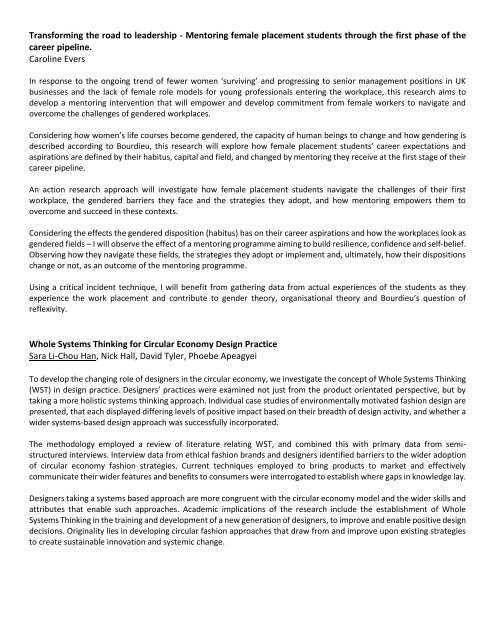Conference Programme FULL (1)
You also want an ePaper? Increase the reach of your titles
YUMPU automatically turns print PDFs into web optimized ePapers that Google loves.
Transforming the road to leadership - Mentoring female placement students through the first phase of the<br />
career pipeline.<br />
Caroline Evers<br />
In response to the ongoing trend of fewer women ‘surviving’ and progressing to senior management positions in UK<br />
businesses and the lack of female role models for young professionals entering the workplace, this research aims to<br />
develop a mentoring intervention that will empower and develop commitment from female workers to navigate and<br />
overcome the challenges of gendered workplaces.<br />
Considering how women’s life courses become gendered, the capacity of human beings to change and how gendering is<br />
described according to Bourdieu, this research will explore how female placement students’ career expectations and<br />
aspirations are defined by their habitus, capital and field, and changed by mentoring they receive at the first stage of their<br />
career pipeline.<br />
An action research approach will investigate how female placement students navigate the challenges of their first<br />
workplace, the gendered barriers they face and the strategies they adopt, and how mentoring empowers them to<br />
overcome and succeed in these contexts.<br />
Considering the effects the gendered disposition (habitus) has on their career aspirations and how the workplaces look as<br />
gendered fields – I will observe the effect of a mentoring programme aiming to build resilience, confidence and self-belief.<br />
Observing how they navigate these fields, the strategies they adopt or implement and, ultimately, how their dispositions<br />
change or not, as an outcome of the mentoring programme.<br />
Using a critical incident technique, I will benefit from gathering data from actual experiences of the students as they<br />
experience the work placement and contribute to gender theory, organisational theory and Bourdieu’s question of<br />
reflexivity.<br />
Whole Systems Thinking for Circular Economy Design Practice<br />
Sara Li-Chou Han, Nick Hall, David Tyler, Phoebe Apeagyei<br />
To develop the changing role of designers in the circular economy, we investigate the concept of Whole Systems Thinking<br />
(WST) in design practice. Designers’ practices were examined not just from the product orientated perspective, but by<br />
taking a more holistic systems thinking approach. Individual case studies of environmentally motivated fashion design are<br />
presented, that each displayed differing levels of positive impact based on their breadth of design activity, and whether a<br />
wider systems-based design approach was successfully incorporated.<br />
The methodology employed a review of literature relating WST, and combined this with primary data from semistructured<br />
interviews. Interview data from ethical fashion brands and designers identified barriers to the wider adoption<br />
of circular economy fashion strategies. Current techniques employed to bring products to market and effectively<br />
communicate their wider features and benefits to consumers were interrogated to establish where gaps in knowledge lay.<br />
Designers taking a systems based approach are more congruent with the circular economy model and the wider skills and<br />
attributes that enable such approaches. Academic implications of the research include the establishment of Whole<br />
Systems Thinking in the training and development of a new generation of designers, to improve and enable positive design<br />
decisions. Originality lies in developing circular fashion approaches that draw from and improve upon existing strategies<br />
to create sustainable innovation and systemic change.


